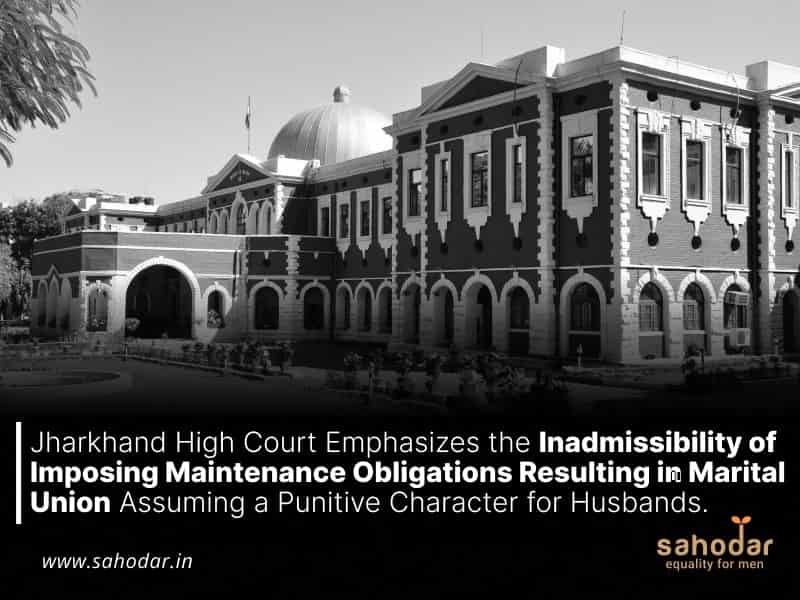During the course of reevaluating the awarded maintenance sum in a matrimonial dispute, the Jharkhand High Court has articulated a perspective. This viewpoint underscores the husband’s moral duty to provide maintenance to his wife, thereby affording her a lifestyle consistent with that enjoyed within their matrimonial abode. However, the court has cautioned against the imposition of such financial obligations on the husband to the extent that it transmutes the institution of marriage into a penal experience, as judiciously observed by Justice Subhash Chand.
“Certainly, it is moral duty of the husband to pay maintenance to her wife so that she may also reside in the same status as would have been in matrimonial house; but it does not mean to squeeze milk from the husband that the marriage becomes felony for the husband.”
The aforementioned statements were delivered in the context of the Jharkhand High Court’s partial acceptance of a petition for revision filed against a judgment from the Family Court in Dhanbad. The Family Court’s judgment in question had directed the husband to provide a monthly maintenance amount of Rs. 40,000 to his wife, with retroactive effect from the date of her initial application.
In the backdrop of this maintenance case, it was revealed that the husband and wife entered into matrimony in 2018, in accordance with Hindu customs. Shortly after their marriage, conflicts arose, primarily rooted in disputes related to dowry and instances of domestic violence. Subsequently, the wife found it necessary to vacate the matrimonial home and seek refuge with her ailing parents. She attested to encountering significant financial hardship, struggling to meet even her basic necessities and medical expenses.
The wife alleged that the husband, a financially affluent businessman, derived substantial income from various sources, estimating his total monthly earnings at Rs. 12.5 lakhs.
Conversely, the husband contended that the court’s judgment was flawed, as it failed to consider his actual income or financial responsibilities. He further asserted that he was the sole provider for his family, which included supporting his ailing mother.
In its verdict, the court underscored the significance of Section 125 of the Criminal Procedure Code (Cr.P.C.) in India, emphasizing its role in promoting social justice and upholding the dignity of individuals, as enshrined in the preamble of the Indian Constitution.
The court laid specific emphasis on the imperative of establishing a just and practical maintenance amount. The court sought to strike a balance, ensuring that the wife receives sufficient support to maintain her standard of living, while not imposing an excessive financial burden on the husband. The court’s primary objective was to prevent the dependent spouse from experiencing destitution, without unduly penalizing the other spouse.
In the specific case under consideration, the court noted that the wife had, in fact, filed Income Tax Returns for the previous four years, despite claiming a lack of any income source, raising questions about her actual financial circumstances.
The court also considered the wife’s education and qualifications to ascertain whether her income was adequate to support a standard of living commensurate with her marital home. However, the court acknowledged that even if the wife had some income, the husband’s responsibility to provide maintenance remained intact.
Additionally, the court took into account the husband’s duty to support his ailing mother, who was dependent on him, and censured the Family Court for neglecting to consider the husband’s financial responsibilities while determining the maintenance amount.
The Court said, “The learned Family Court did not take into consideration, the liabilities of the petitioner – Niraj Kathuria while fixing quantum of maintenance, which are evident from the documentary evidence on record. The learned Family Court has assessed the income of the petitioner Rs.1.20 lacs to Rs.1.25 lacs monthly from Shree Shakti Infrastructure which was the gross income of the petitioner, not the net income. The learned Family Court has taken into account the landed property in the name of the petitioner at Pasari Barwa, Panduki and Mouza Amaghata totaling to Rs.28,46,529/-; but there is nothing on record that from these properties the petitioner was fetching any income.”
In view of the aforementioned factors, the court arrived at the determination that the judgment rendered by the Family Court had been founded upon inaccurate assessments and, as a consequence, the granted maintenance amount was deemed inequitable. Consequently, the judgment of the Family Court was subject to revision, leading to an order wherein the petitioner was directed to disburse a monthly sum of Rs. 25,000 to his wife, with this provision taking effect from the date of the initial application. Meanwhile, the remaining directives issued by the Family Court were upheld without modification.

